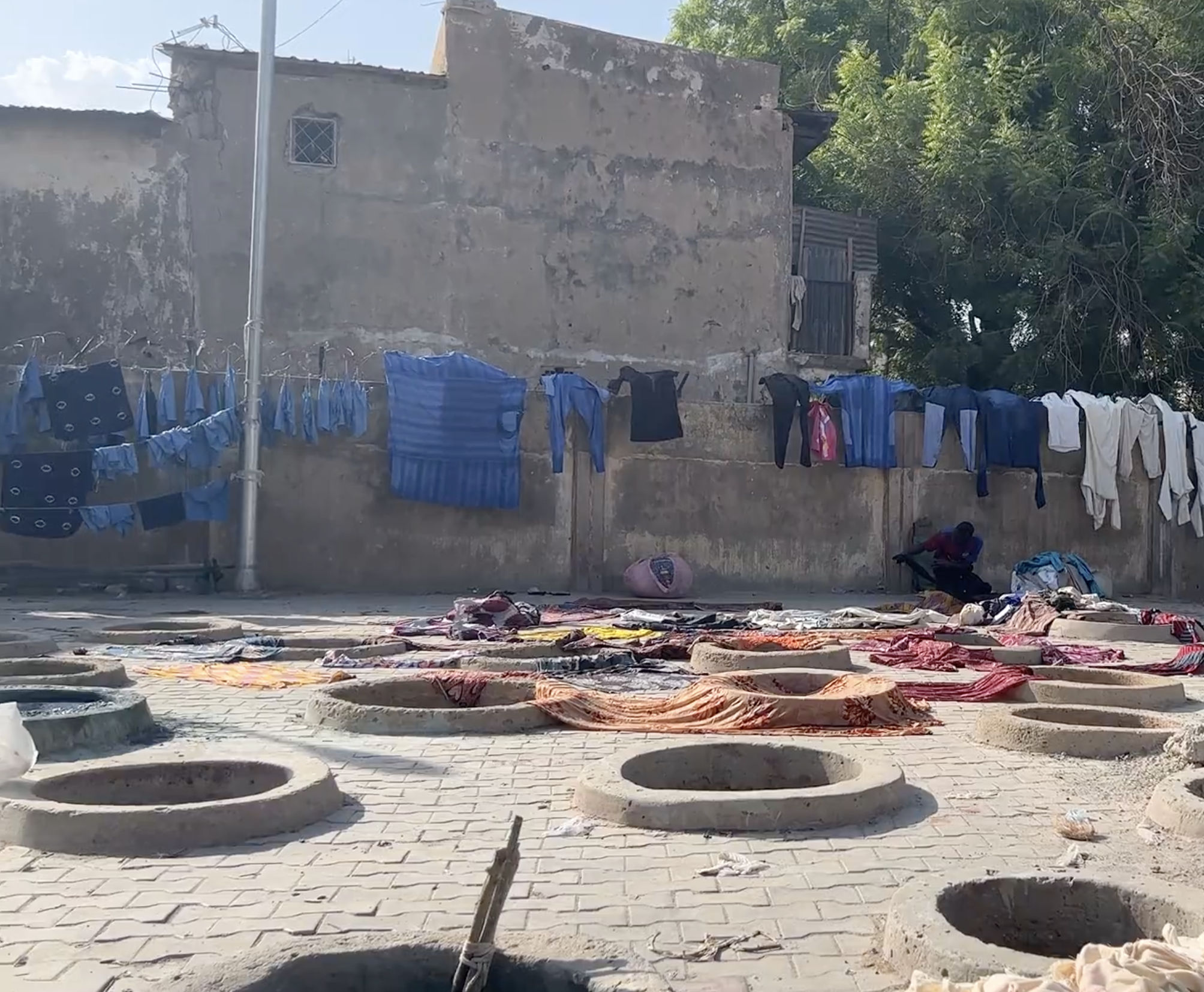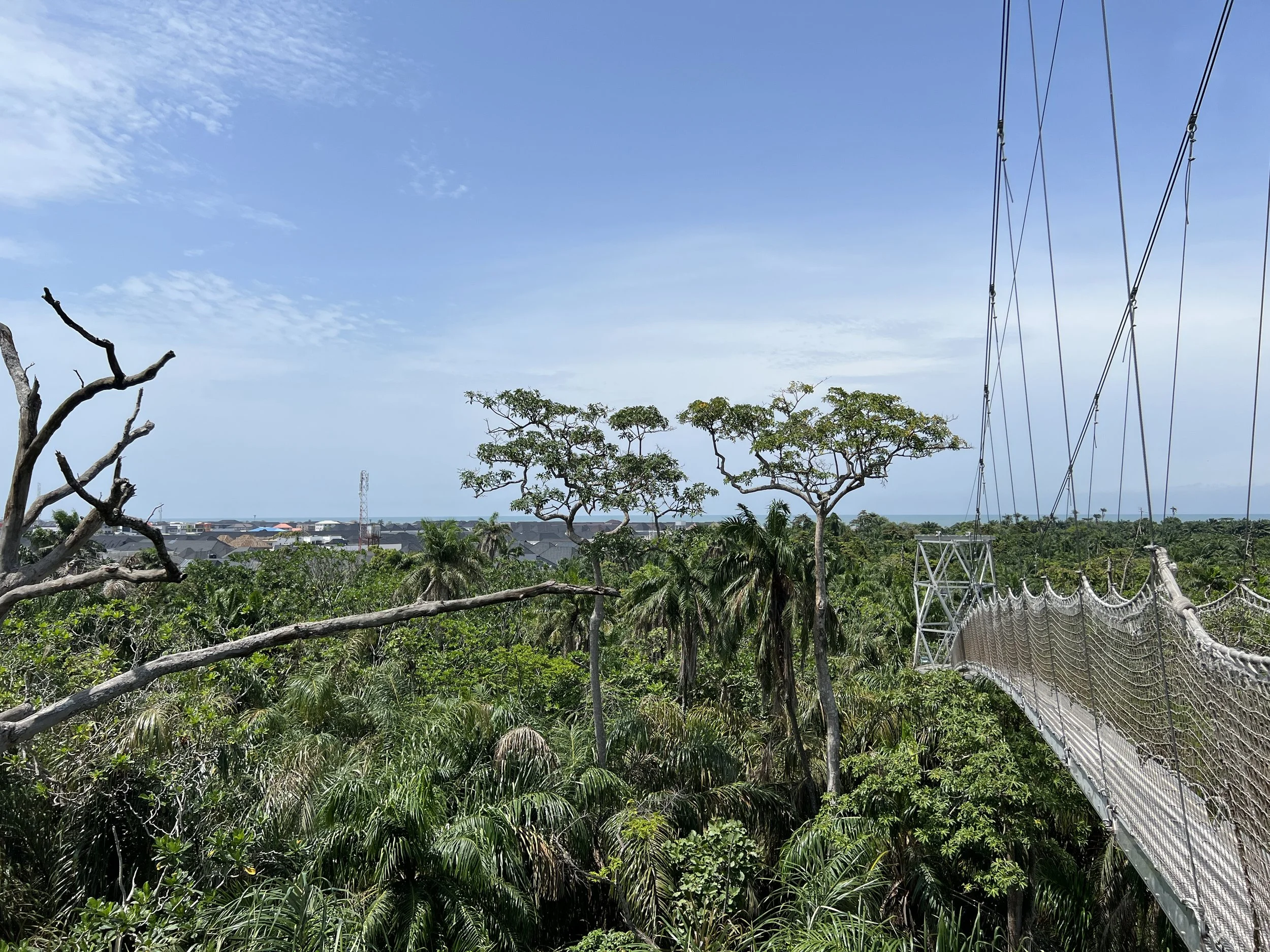No Scam: A Guide to Nigeria
I recently spent a week in two of Nigeria’s largest cities: Lagos and Kano. Outside of North Africa, the continent was unexplored by me. Without knowing what to expect, I was excited to experience Nigeria. Thankfully, I have a friend who lives in Lagos and showed me around the city, and she referred me to a tour guide in Kano. Here are some recommendations based on my time in these two cities of the West African Nation.
See:
1. Dye Pits
One of the popular crafts in the northern region of Kano is textile dying. Deep dye pits are constructed to dye clothes, mats, and blankets and then filled with ash, ground indigo, and water. Depending on how long the item is submerged, the color can be anywhere from light blue to blue-black. Attractive white designs are also added through intricate knot tying. When they’re done using the dye, local people often drink it to cure ailments like skin irritation. Although, I must admit that I did not try drinking the concoction myself.
2. Livestock Market
Kano’s livestock market is a fascinating site, allowing visitors to glimpse into the entire life cycle from livestock to animal products. When you walk in, you’ll be greeted by herds of cows and camels. Then, these animals are taken to a processing center, after which butchers start to break down the carcass.
One of the specialties of this market is making the regional delicacy ponmo, cow skin. To make it, the carcasses are first skinned, and the skins are put over a fire to burn away all the hairs. Next, washing and scrubbing removes all the ash and debris, leaving behind a thick skin that will go into various dishes. What I loved the most about this market was that an on-site blacksmith makes the tools necessary to do the butchering. This truly is a one stop shop!
Do:
Lekki Conservation Center
In Lagos, you will certainly feel the tropical climate, but given how large the city is, it’s easy to forget that you’re in one of the most biodiverse places on Earth. Thankfully, the Lekki Conservation Center is a great place to see the region’s nature while being only 30 minutes from downtown. Here, you’ll see loads of monkeys and alligators and can enjoy some grilled chicken in the recreation area. This 190-acre park also offers the region’s longest canopy walk, where you can walk between seven stops up in the trees and see the forest from all levels.
The view from the canopy walk
I came here on my first day in Lagos, but frankly, I’d recommend going after you’ve been in the city a bit and are exhausted from all the bustle of the metropolis. It’ll be a great little getaway.
2. Farmer’s Market
On Lagos’ Victoria Island, you can find a top-notch farmer’s market on Saturdays. It’s not particularly large but has many vegetables that are tough to find in local grocery stores, like kale and beets. Since I was staying at a hotel, I just bought some food to eat there, including the best pineapple juice I’ve ever had. Also, there’s a pasta stand run by an awesome lady named Renee, who used to live in America but moved back to Nigeria to be with her family.
Eat:
Nigerian Delicacies
It goes without saying that Nigerian food is worth trying. Jollof rice became a staple for me— it’s rice cooked with tomatoes, peppers, onions, and mixed vegetables. But please be warned that Nigerians make it quite spicy, so I recommend asking for them to dial back the spice a bit if you are not accustomed to such heat. As a meat fanatic, I was a huge fan of suya: thin, spiced grilled meat (chicken or beef). It’s a great little dish to share before having your main course and is often eaten with toothpicks. For breakfast one day, I also had masa, which is a rice ball with yeast you dip into vegetable soup. All around, I find Nigerian food to be exceptionally tasty and different from any other cuisine I’ve had before.
2. Lebanese Food
I must admit, I never thought I’d be recommending people eat Lebanese food in Nigeria, but here we are. Early on in my time there, I learned that there are many Lebanese who immigrated to Nigeria and built some impressive businesses there, including the hotel I stayed in in Kano. As a result, there are also some top-notch Lebanese restaurants in the country. My favorite was in Lagos, Salma’s. The labneh (strained yogurt), grilled prawns, and kafta (grilled ground meat) transported me back to the Middle East.
Overall, I had a great week in Nigeria. It’s certainly unlike any other country I’ve been to before, but I won’t soon forget the kindness of the people. Every time you pass someone in the hotel or on a trail, it’s customary to greet them with a “good morning” or “good afternoon.” There’s something quite nice about people taking that moment out of their day to acknowledge another’s presence. If you enjoy witnessing different cultures, I can highly recommend visiting Lagos and Kano. I hope to return soon to see some of the national parks in the east of the country and the capital, Abuja. There’s so much of this country and region for me to discover— and I can’t wait to do it soon.
Nigeria is UN Country 61/193 for me.





